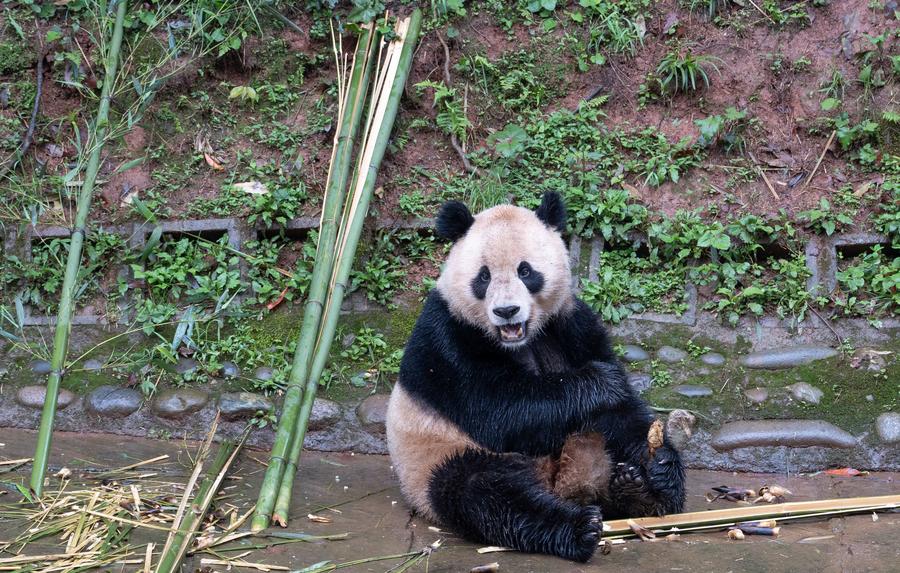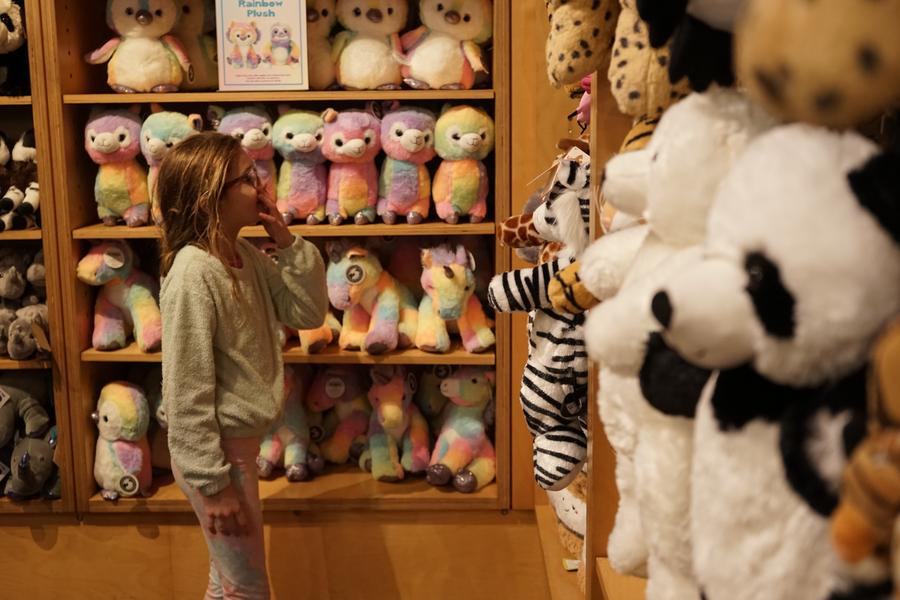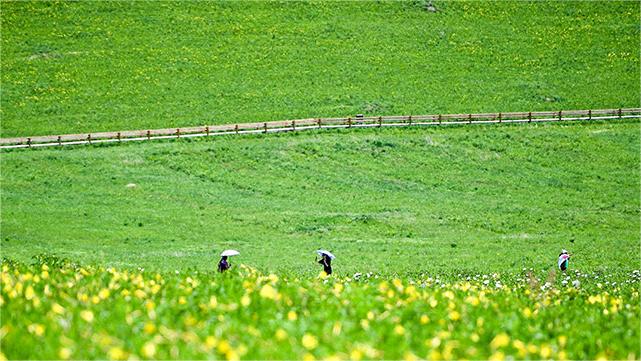Two Chinese giant pandas arrive in U.S., first time in two decades

This photo taken on April 18, 2024, shows giant panda Xin Bao at the Bifengxia Panda Base of the China Conservation and Research Center for the Giant Panda in Ya'an, southwest China's Sichuan Province. (Xinhua/Xue Chen)
"We are incredibly excited to welcome Yun Chuan and Xin Bao to the San Diego Zoo family," said Paul Baribault, the president and chief executive officer for San Diego Zoo Wildlife Alliance, noting that the nonprofit conservation organization's long-standing partnership with its Chinese partners "has been instrumental in advancing giant panda conservation, and we look forward to continuing our work together to ensure the survival and thriving of this iconic species."
LOS ANGELES/Chengdu, June 27 (Xinhua) -- Two giant pandas, Yun Chuan and Xin Bao, arrived in California, the United States, Thursday morning on a chartered flight from China, for a 10-year international giant panda protection cooperation with San Diego Zoo, marking a new round of giant panda protection cooperation between China and the United States.
Yun Chuan, a 5-year-old male, and Xin Bao, a 4-year-old female, were selected from the China Conservation and Research Center for the Giant Panda (CCRCGP). The black-and-white bears departed from the Bifengxia Panda Center at Ya'an City in southwest China's Sichuan Province Wednesday evening.
The duo, which transited through Hong Kong and arrived in Los Angeles International Airport, were accompanied by five experienced breeders and veterinarians during the journey.
The panda pair, the first to enter the United States in over two decades, will travel to San Diego Zoo soon after their arrival in Los Angeles. They will be quarantined for a minimum of 30 days, per standard procedure, and the public debut date will be announced after the animal care team feels the bears are ready to meet visitors.
The CCRCGP has conducted scientific research cooperation with San Diego Zoo for over 25 years, with fruitful results in the protection, breeding, and disease control of giant pandas, and related public education.
Giant pandas are one of the world's most endangered species. Nearly 1,900 pandas live in the wild, mostly in the provinces of Sichuan and Shaanxi in China, rising from 1,100 in the 1980s.

This photo taken on April 18, 2024, shows giant panda Yun Chuan at the Bifengxia Panda Base of the China Conservation and Research Center for the Giant Panda in Ya'an, southwest China's Sichuan Province. (Xinhua/Xue Chen)
As one symbol of the cooperation, Yun Chuan is the son of Zhen Zhen, who was born at San Diego Zoo in 2007, and the grandson of Bai Yun, who lived at the zoo for more than 20 years. Then-27-year-old Bai Yun and her son, Xiao Liwu, San Diego Zoo's last two giant pandas, were sent back to China in 2019 as the zoo's last conservation agreement with China ended.
Many San Diego residents, tourists, as well as park officials were reluctant to say goodbye to those giant pandas, which have long been envoys of friendship between the Chinese and American peoples. They have been looking forward to welcoming the beloved zoo icon back.
"We are incredibly excited to welcome Yun Chuan and Xin Bao to the San Diego Zoo family," said Paul Baribault, the president and chief executive officer for San Diego Zoo Wildlife Alliance, in a press release, noting that the nonprofit conservation organization's long-standing partnership with its Chinese partners "has been instrumental in advancing giant panda conservation, and we look forward to continuing our work together to ensure the survival and thriving of this iconic species."
Baribault told Xinhua in an exclusive interview in Sichuan earlier this week that the whole organization is excited to welcome the pandas and has "been doing quite a bit to get ready" for their arrival.
"We are getting their spaces all set and expanded the space for them, making it even better than it ever was before," he said, adding, "We've also been preparing all their food. Our scientists have been getting ready. Our teams have been coming over here to get to know the pandas. So that transition is smooth and easy for them."

A girl visits a gift shop with giant panda-themed plushies at the San Diego Zoo in San Diego, California, the United States, on Feb. 22, 2024. (Photo by Zeng Hui/Xinhua)
San Diego Zoo, one of the most visited zoo in the country, is the first U.S. zoo to have a cooperative conservation program with Chinese partners. Located north of downtown San Diego in Balboa Park, it is home to more than 12,000 rare and endangered animals representing over 680 species and subspecies.
"San Diegans can't wait to see these amazing animals!" wrote Todd Gloria, mayor of San Diego, on social media platform X, who attended a farewell ceremony in Ya'an, where the pandas had been residing.
In an interview with Xinhua, the mayor described the panda pair as "wonderful ambassadors from China," noting their arrival is "the opportunity to have not only the giant pandas at the San Diego Zoo, but to really showcase Chinese culture, Chinese people, Chinese traditions, and symbols and icons."
"One thing I know about Chinese and Americans is our shared love of the beautiful creatures. This exchange is a wonderful way to tie our two communities closer together and that kind of tying together is a way to promote understanding and mutual respect," he added.
According to Gloria, the pair could attract more visitors to San Diego Zoo. "We anticipate a 20 to 40 percent boost in attendance ... because we know people love these creatures," he said.
Photos
Related Stories
Copyright © 2024 People's Daily Online. All Rights Reserved.









